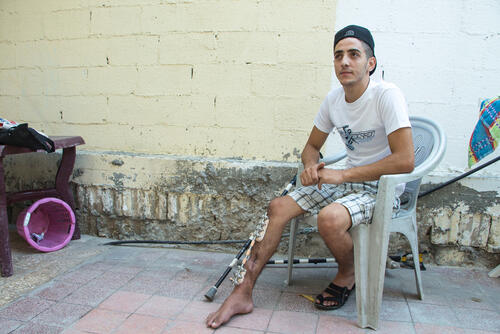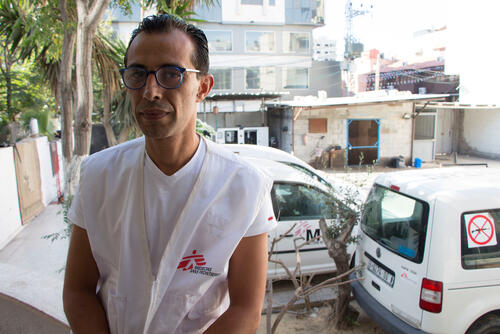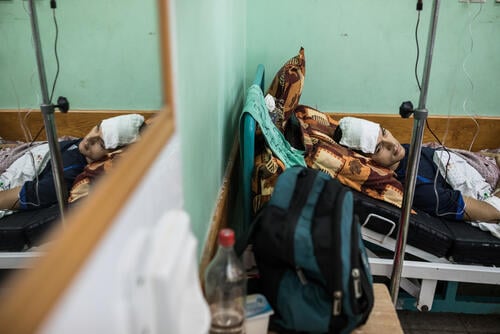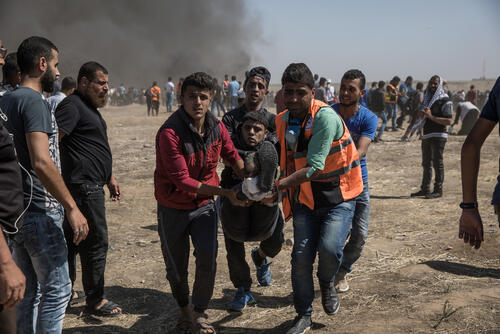Eyad, 22 years old, was shot in the leg during the ‘Great March of Return’ demonstrations in Gaza on 14 May – one of the deadliest days witnessed by MSF teams in the six months of protests.
Eyad needs a bone graft and limb reconstructive surgery, which is not currently possible inside the Gaza strip.
His case has been accepted for treatment at MSF’s specialist surgical hospital in Amman, Jordan – but for people living in Gaza, requesting the authorisation to leave from the Israeli authorities is a lengthy, difficult process which often ends in refusal.
“I still remember vividly the day I was shot: the bullet entered my leg like an injection and then I felt a hot sensation on my other leg. I looked down and saw lots of blood, and I realised I had been wounded. I was in so much pain.
After the bullet entered my leg I started to shake, and it felt like I had electricity coursing through my body. At first, I was stunned by what I saw.
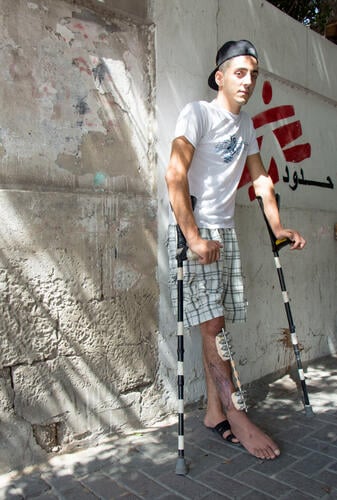
I was shot on 14 May 2018. Like a lot of Palestinians, I was shot in the leg. It just goes to show how barbaric the Israeli army was towards us that day.
I went to the demonstrations because I love my country and I am trying to defend it. I wanted to show everyone that we have the right to our lands and the right to have our homes back.
The demonstration was peaceful. Then the Israeli army started shooting. I knew it was going to be dangerous, so I went alone. I didn’t want to see any of my friends injured or killed. I wanted to free our land, our home, our sacred places. Israel can take all they want; I just want them to give us back our land.
My mother tried to convince me not to go and begged me to stay at home. She called my grandparents to try and persuade me. But they could not stop me. I had made up my mind.
Ever since I was shot, I’ve had trouble sleeping. When I sleep, it feels like knives are moving inside my leg and electricity is coursing through my body.
I don’t move around a lot, I don’t go out; only if I have to. I prefer not to move around a lot because it is just so painful.
My parents and siblings are caring for me – they take good care of me. They bring me whatever I need.
“All I hope is to be able to walk normally again”
I go to MSF’s clinic in Gaza three times a week for dressing changes and to have physiotherapy. My condition started to improve after the first debridement operation, which cleaned the gunshot wound and took out the infected blood.
I have had about six operations, including the debridement of the wound, attaching the external fixator to stabilise the bone, and a skin graft where they took skin from my thigh to cover the gunshot wound.
The next stages of my treatment must be done in Jordan, at the MSF reconstructive surgical hospital in Amman. They plan to use a bone graft to fix the shattered bone, and a plastic surgeon will then reconstruct my damaged leg.
When I heard they wanted to send me to Jordan, I was full of fear because I thought the Israeli army wouldn’t let me leave Gaza. I thought I’d have to have an amputation.
But once I heard that the Amman hospital had accepted me, I started to feel hopeful again. I started to see that things might be ok. Now I am just waiting to see if I am permitted to leave Gaza.
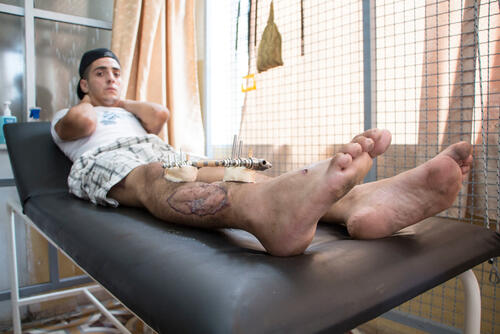
“I have lost everything”
I left school at high school and I don’t have a job. Actually, this is one of the main reasons I went to the border to demonstrate, because I don’t have job and I don’t have anything to do. I wish I could work.
But there is no work in Gaza. I am a musician, it’s not a profitable job, but I love to play instruments like the flute and drums.
Have I returned to the protests? That is an embarrassing question... no, I haven’t. After experiencing this amount of pain and losing so much of my life from what happened, I don’t want to go back.
I have lost friends, I have lost the ability to go out or move around as I wish. I find it difficult to play my instruments. I have lost everything.
My only hope is to return to how I used to be.
But I know that won’t happen... I can’t swim or play football anymore. I was a really good footballer. I’m not able to run the way I used to. I just hope that, with further surgery, I will be able to walk normally again, without any pain. That’s all I hope.
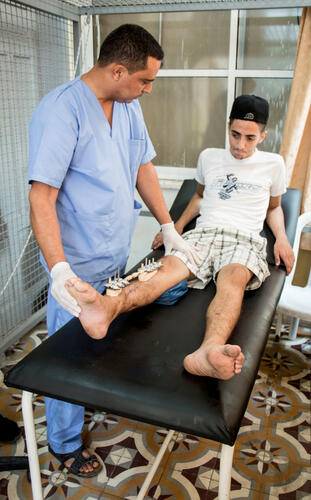
“It is overwhelming to see your friends die.”
My friends still go to the demonstrations; some of them have also been wounded. One of my friends also got shot and now has almost exactly the same injury as me. Another friend who helped me when I was injured has been killed. He was at a demonstration helping another wounded person when he died.
I am trying to convince other people not to go to the demonstrations. I don’t want them to experience the pain I have. The negatives of protesting outweigh the positives. Going there is so dangerous: people may lose their hopes and futures. They need to stay away: the Israeli army is really violent.
As Palestinians, we want these protests to be peaceful. But Israel sees this as a violation of their freedom. All we want is to return to our lands. We protest to show everyone that we are Arab, that we are all together in this, and that we support each other. That’s why we go to the demonstrations.”



